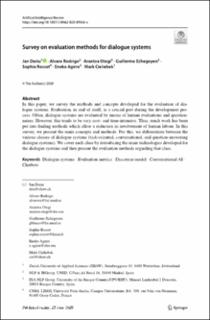Please use this identifier to cite or link to this item:
https://doi.org/10.21256/zhaw-20318Full metadata record
| DC Field | Value | Language |
|---|---|---|
| dc.contributor.author | Deriu, Jan Milan | - |
| dc.contributor.author | Rodrigo, Alvaro | - |
| dc.contributor.author | Otegi, Arantxa | - |
| dc.contributor.author | Echegoyen, Guillermo | - |
| dc.contributor.author | Rosset, Sophie | - |
| dc.contributor.author | Agirre, Eneko | - |
| dc.contributor.author | Cieliebak, Mark | - |
| dc.date.accessioned | 2020-08-05T15:16:09Z | - |
| dc.date.available | 2020-08-05T15:16:09Z | - |
| dc.date.issued | 2020 | - |
| dc.identifier.issn | 0269-2821 | de_CH |
| dc.identifier.issn | 1573-7462 | de_CH |
| dc.identifier.uri | https://digitalcollection.zhaw.ch/handle/11475/20318 | - |
| dc.description.abstract | In this paper, we survey the methods and concepts developed for the evaluation of dialogue systems. Evaluation, in and of itself, is a crucial part during the development process. Often, dialogue systems are evaluated by means of human evaluations and questionnaires. However, this tends to be very cost- and time-intensive. Thus, much work has been put into finding methods which allow a reduction in involvement of human labour. In this survey, we present the main concepts and methods. For this, we differentiate between the various classes of dialogue systems (task-oriented, conversational, and question-answering dialogue systems). We cover each class by introducing the main technologies developed for the dialogue systems and then present the evaluation methods regarding that class. | de_CH |
| dc.language.iso | en | de_CH |
| dc.publisher | Springer | de_CH |
| dc.relation.ispartof | Artificial Intelligence Review | de_CH |
| dc.rights | http://creativecommons.org/licenses/by/4.0/ | de_CH |
| dc.subject | Dialogue systems | de_CH |
| dc.subject | Artificial intelligence | de_CH |
| dc.subject | Evaluation | de_CH |
| dc.subject | Deep learning | de_CH |
| dc.subject.ddc | 006: Spezielle Computerverfahren | de_CH |
| dc.title | Survey on evaluation methods for dialogue systems | de_CH |
| dc.type | Beitrag in wissenschaftlicher Zeitschrift | de_CH |
| dcterms.type | Text | de_CH |
| zhaw.departement | School of Engineering | de_CH |
| zhaw.organisationalunit | Institut für Informatik (InIT) | de_CH |
| dc.identifier.doi | 10.1007/s10462-020-09866-x | de_CH |
| dc.identifier.doi | 10.21256/zhaw-20318 | - |
| zhaw.funding.eu | No | de_CH |
| zhaw.issue | 1 | de_CH |
| zhaw.originated.zhaw | Yes | de_CH |
| zhaw.pages.end | 810 | de_CH |
| zhaw.pages.start | 755 | de_CH |
| zhaw.publication.status | publishedVersion | de_CH |
| zhaw.volume | 54 | de_CH |
| zhaw.publication.review | Editorial review | de_CH |
| zhaw.webfeed | Software Systems | de_CH |
| zhaw.webfeed | Natural Language Processing | de_CH |
| zhaw.funding.zhaw | LIHLITH - Learning to Interact with Humans by Lifelong Interaction with Humans | de_CH |
| zhaw.author.additional | No | de_CH |
| zhaw.display.portrait | Yes | de_CH |
| Appears in collections: | Publikationen School of Engineering | |
Files in This Item:
| File | Description | Size | Format | |
|---|---|---|---|---|
| 2020_Deriu-etal_Survey-on-evaluation-methods-for-dialogue-systems.pdf | 1.94 MB | Adobe PDF |  View/Open |
Show simple item record
Deriu, J. M., Rodrigo, A., Otegi, A., Echegoyen, G., Rosset, S., Agirre, E., & Cieliebak, M. (2020). Survey on evaluation methods for dialogue systems. Artificial Intelligence Review, 54(1), 755–810. https://doi.org/10.1007/s10462-020-09866-x
Deriu, J.M. et al. (2020) ‘Survey on evaluation methods for dialogue systems’, Artificial Intelligence Review, 54(1), pp. 755–810. Available at: https://doi.org/10.1007/s10462-020-09866-x.
J. M. Deriu et al., “Survey on evaluation methods for dialogue systems,” Artificial Intelligence Review, vol. 54, no. 1, pp. 755–810, 2020, doi: 10.1007/s10462-020-09866-x.
DERIU, Jan Milan, Alvaro RODRIGO, Arantxa OTEGI, Guillermo ECHEGOYEN, Sophie ROSSET, Eneko AGIRRE und Mark CIELIEBAK, 2020. Survey on evaluation methods for dialogue systems. Artificial Intelligence Review. 2020. Bd. 54, Nr. 1, S. 755–810. DOI 10.1007/s10462-020-09866-x
Deriu, Jan Milan, Alvaro Rodrigo, Arantxa Otegi, Guillermo Echegoyen, Sophie Rosset, Eneko Agirre, and Mark Cieliebak. 2020. “Survey on Evaluation Methods for Dialogue Systems.” Artificial Intelligence Review 54 (1): 755–810. https://doi.org/10.1007/s10462-020-09866-x.
Deriu, Jan Milan, et al. “Survey on Evaluation Methods for Dialogue Systems.” Artificial Intelligence Review, vol. 54, no. 1, 2020, pp. 755–810, https://doi.org/10.1007/s10462-020-09866-x.
Items in DSpace are protected by copyright, with all rights reserved, unless otherwise indicated.